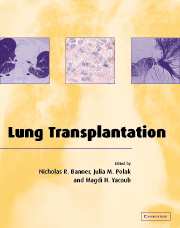Book contents
- Frontmatter
- Contents
- List of contributors
- Preface
- Part I Pulmonary disease
- Part II Lung transplantation
- 11 Overview
- 12 Patient selection and indications for lung transplantation
- 13 Single and bilateral lung transplantation
- 14 Combined heart and lung transplantation
- 15 Anaesthesia and intensive care
- 16 Medical management
- 17 Immunological mechanisms of graft injury
- 18 Pharmacological immunosuppression
- 19 Chronic lung allograft dysfunction
- 20 Infectious complications
- 21 Cytomegalovirus infection
- 22 Imaging
- 23 Transplant pathology
- 24 Haematology
- 25 Psychology
- 26 The current status of lung transplantation
- Part III Future directions
- Index
11 - Overview
Published online by Cambridge University Press: 06 January 2010
- Frontmatter
- Contents
- List of contributors
- Preface
- Part I Pulmonary disease
- Part II Lung transplantation
- 11 Overview
- 12 Patient selection and indications for lung transplantation
- 13 Single and bilateral lung transplantation
- 14 Combined heart and lung transplantation
- 15 Anaesthesia and intensive care
- 16 Medical management
- 17 Immunological mechanisms of graft injury
- 18 Pharmacological immunosuppression
- 19 Chronic lung allograft dysfunction
- 20 Infectious complications
- 21 Cytomegalovirus infection
- 22 Imaging
- 23 Transplant pathology
- 24 Haematology
- 25 Psychology
- 26 The current status of lung transplantation
- Part III Future directions
- Index
Summary
Introduction
Lung transplantation has been shown to be an effective means of treating a variety of conditions including pulmonary vascular and parenchymal lung disease. Despite many advances in lung transplantation over the preceding decades there are still many challenges that need to be addressed if lung transplantation is to achieve its full potential.
The scarcity of organs suitable for transplantation
The shortage of donor organs remains an on-going difficulty, with the number of transplants performed continuing to fall in the UK [1] and elsewhere. It is therefore increasingly important to improve public awareness of the need for organ donation and develop strategies to optimize the number of cadaveric donors and explore alternative strategies.
Abu Dhabi declaration
At the recent organ transplantation congress in Abu Dhabi, delegates came to the conclusion that there are a considerable number of patients who would benefit from organ transplantation in every country. The Congress felt there is currently no adequate alternative therapy for most of these patients except transplantation. Sending patients from one country to another for transplantation is impractical because each country has a donor problem of its own. Therefore it is important for each country to start its own organ transplant programme. For this purpose cooperative effort is required, which includes the public, government, media, heath care professionals and religious leaders. There is a need to establish a voluntary foundation to support research in, and practice of, transplantation. The input and guidance of religious leaders and ethics committees are an essential part of this venture.
- Type
- Chapter
- Information
- Lung Transplantation , pp. 113 - 119Publisher: Cambridge University PressPrint publication year: 2003

